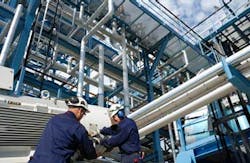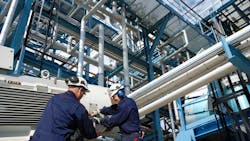US petrochemical industry growth drives demand for skilled workers
More than $217 billion will be invested over the next six years in downstream petrochemical production in the United States as a result of the shale gas boom that is boosting the U.S. petrochemical industry, according to a new analysis from IHS. This will in turn lead to a capacity increase in crude oil production of more than 52 million barrels per day over the same period, the company said.
The unprecedented growth in shale gas production is beneficial to the U.S. economy in more than one way. The push it has given to the domestic petrochemical industry is creating thousands of jobs, many of which are for people who lack specialized skills to compete, the research from IHS found.
Jeffrey S. Plotkin, vice president of training and education at IHS Chemical, commented that the shale revolution has brought down the price of feedstocks, giving petrochemical companies that utilize such materials a cost advantage over others that rely on naphtha for manufacturing their products. This has changed the face of the industry dramatically and is shifting the balance of power, creating a new competitive landscape and jobs for a new generation of employees worldwide, he added. Just a few years ago, many experts predicted that the U.S. petrochemical industry would decline and people were advised not to follow careers in that field. Things have changed a lot since then and the industry needs job applicants more than ever, Plotkin said.
RELATED: Global petrochemical producers rethink strategies to remain competitive
There are people working directly in the industry, such as chemists, engineers or process operators, but there are also jobs indirectly related to petrochemicals, including human resources, procurement, business management, strategic planning and accounting. As production capacity grows, new plants will have to be constructed and infrastructure needs to be improved for product distribution. All the people that will take part in the process need to be trained in the basics of the industry, Plotkin pointed out.
In order to facilitate the smooth entry into the industry of these workers, IHS is organizing a series of public courses that aim to educate new and seasoned professionals on the latest industry fundamentals so that each of them is able to contribute and to succeed in an industry that is of major importance to U.S., IHS said.
Apart from the traditional professional courses run by IHS, the organization is launching a new service — three-day, open education courses, which introduce attendees to the basics of the industry to help them understand and cope with changing dynamics. They also put the current state of the industry into an historical context and reveal its connections with other fields, including chemistry, economics, engineering and marketing.
The courses are designed to help workers from various backgrounds and will take place in several locations across the globe. In June, Houston, Texas, will host the first course, followed by London, Shanghai, Singapore, Dubai, Sao Paolo, Frankfurt, another session in Houston, Beijing and San Francisco/Santa Clara, Calif.

